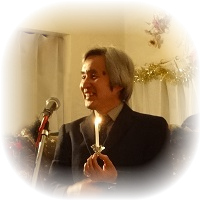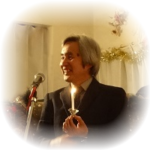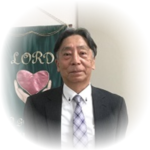↓Audio link to the sermon:(1st worship recording)
(If you can’t listen on your iPhone, please update your iOS)
Firstly, a righteous person is not a perfect person. As Romans 1:17 says, by faith we are forgiven of our sins and made righteous. According to the New Testament, the righteous are those who have put their trust in Christ and accepted redemption through the Cross. A Christian is a person who has faith in Christ, has received a status of righteousness from God, and lives their life together with God. In daily life, they are in the process of being saved—that is, to become like Christ—and they look forward to their salvation being perfected one day.
In contrast, those who are considered unrighteous are those who do not trust in God, including the leaders of the kingdom of Judah during Habakkuk’s time, as well as the leaders of Babylon. The people of Judah lost their faith in the one true God and were swayed by changing circumstances.
As we saw last week, Habakkuk chapter 2 contains God’s answer to one of Habakkuk’s prayers. The answer came in the form of a vision. Today we will look at that vision while thinking about what it means to live by faith.
The vision given to Habakkuk was about God’s judgment on Babylon, but it also serves as a message to all leaders who reject or defy God. Babylon was so proud of its own strength and the wealth it continued to accumulate, but their depravity brought God’s judgment. The unrighteous have proud hearts and do not believe the words of God; they live their lives according to changing circumstances and are arrogant. It’s easy to imagine leaders who fit this description. There are many leaders in the world like this, who act as dictators, who rob people of their rights and freedom, who covet high positions. Today’s message is that such leaders will be judged by God someday.
Another element of this vision that we will pay attention to is the repeated phrase “woe” or “woe to him”. It is a phrase that expresses scorn or disapproval. In this passage, God scorns the kind of unrighteousness I described earlier. It is really sad to see what people do to each other. With that, let us start reading from Habakkuk chapter 2, verse 5.
Verse 5 says, “Indeed, wine betrays him; he is arrogant and never at rest. Because he is as greedy as the grave and like death is never satisfied, he gathers to himself all the nations and takes captive all the peoples.” Through conquering others, Babylonians gathered great wealth for themselves. It is as if Babylon is drunk. Drunk on pride, greed, and a thirst that cannot be satisfied; he is obsessed with conquering others, gaining power and wealth. But from God’s point of view, Babylon is foolish. And so God says, “Woe to him.”
Verse 6, the second half says, “Woe to him who piles up stolen goods and [enriches himself] by extortion! How long must this go on?” This is wealth that does not belong to Babylon. The phrase “enrich” is an interesting expression. It is used in the context of enriching soil with fertilizer that is decomposing or rotting. And so God says to them in verse 7: “Will not your creditors suddenly arise? Will they not wake up and make you tremble? Then you will become their prey.” Verse 8: “Because you have plundered many nations, the peoples who are left will plunder you.” God will judge them by letting them suffer the same thing they did to others.
Verse 9 contains the second “woe.” God says, “Woe to him who builds his house by unjust gain, setting his nest on high to escape the clutches of ruin!” Babylon built up its own house by oppressing others and thought they were safe from consequences. But the very stones and the wood of this house built on injustice will cry out about Babylon’s foolishness. The palace of Babylon represents its shameful sins.
Verse 12 contains the third “woe.” God says, “Woe to him who builds a city with bloodshed and establishes a town by injustice!” The Babylonians enslaved many people from other nations and used them to build their cities. Their cities were built on bloodshed. In response to that, God says in verse 14, “For the earth will be filled with the knowledge of the glory of the Lord as the waters cover the sea.” It’s a strange declaration, but it means that God’s time will come; Babylon will be destroyed and God the Savior will come upon the earth. God’s glory will fill the earth; the kingdom of the Messiah will appear. (Also see Isaiah 11:9: “They will neither harm nor destroy on all my holy mountain, for the earth will be filled with the knowledge of the Lord as the waters cover the sea.”)
Verse 15 contains the fourth “woe”. God says, “Woe to him who gives drink to his neighbors, pouring it from the wineskin till they are drunk, so that he can gaze on their naked bodies!” Babylon tries to dominate even his allies. This verse uses a metaphor of sexual violence. Verse 16 goes on to say, “disgrace will cover your glory.” Later it will be Babylon’s turn to have its shame exposed. Verse 17 says, “The violence you have done to Lebanon will overwhelm you.” Babylon had trampled with violence on Lebanon, a lush region known for its cedar trees. In our world, we hear reports everywhere of women subjected to violence and their freedom being taken away. But God will one day expose the sin of those who are cruel and oppressive to them.
Verse 19 contains the fifth “woe.” God says, “Woe to him who says to wood, ‘Come to life!’ Or to lifeless stone, ‘Wake up!’ Can it give guidance? It is covered with gold and silver; there is no breath in it.” The Babylonians worshipped and prayed to idols. In verse 18 God says, “Of what value is an idol carved by a craftsman? Or an image that teaches lies? For the one who makes it trusts in his own creation; he makes idols that cannot speak.” In other words, it is foolish to put one’s hope in a manmade statue. Statues will do no good; idols will not help when God’s judgment comes on Babylon.
And so, through Habakkuk’s conversation with God, he learned that Babylon was an instrument of judgment on Jerusalem for only a period of time. This prayer ends with verse 20, “The Lord is in his holy temple; let all the earth be silent before him.” Certainly, Jerusalem would be destroyed. But so would Babylon. This is God’s judgment for those who stray from His ways to pursue their own prosperity. In contrast, we are called to seek His ways and to be still before the one true God. (See Psalm 76:8-9, 12.)
Last Sunday, our church hosted a praise and prayer session for Tokyo district churches from our denomination. While worshipping, we took time to listen to what God is saying to our hearts. The song called “This is my story” left an impression on me. I felt thankful that I have encountered God in ways which can allow me to say at the end of my life, “This is my story”. I believe that, some day, each of us here will be able to say “This is my story” with gratitude. Every day, our circumstances keep changing. But we will one day meet the God who carries out righteous judgment. And through our faith, we will be taken up to heaven by him. God is guiding our lives. Let us trust He is doing that.
We will read Habakkuk 2:4 again. “See, the enemy is puffed up; his desires are not upright—
but the righteous person will live by faith.” How will you live by faith in this society? When things are difficult, God’s help will surely be with you.
The book of Hebrews, when it teaches about faith in chapter 11, mentions this: “By faith Jacob, when he was dying, blessed each of Joseph’s sons, and worshiped as he leaned on the top of his staff” (Hebrews 11:21). The book of Genesis records Jacob’s prayer of blessing, and it begins like this: “May the God before whom my fathers Abraham and Isaac walked faithfully, the God who has been my shepherd all my life to this day . . .” (Genesis 48:15). Jacob declares his faith in God, “who has been shepherd all my life to this day”. May we also be able to say that God has been a shepherd all our life to this day. We don’t know about tomorrow, but we know that God our Shepherd will be there. I pray that this will be our testimony.
(If you can’t hear from the bar above, click the blue button)
iPhone





 日本語
日本語